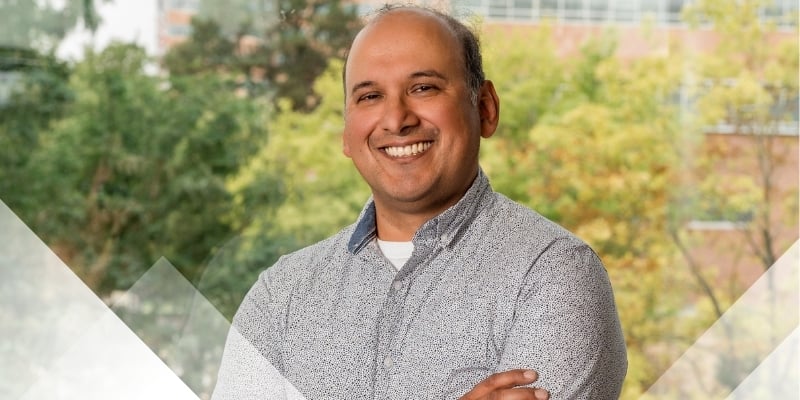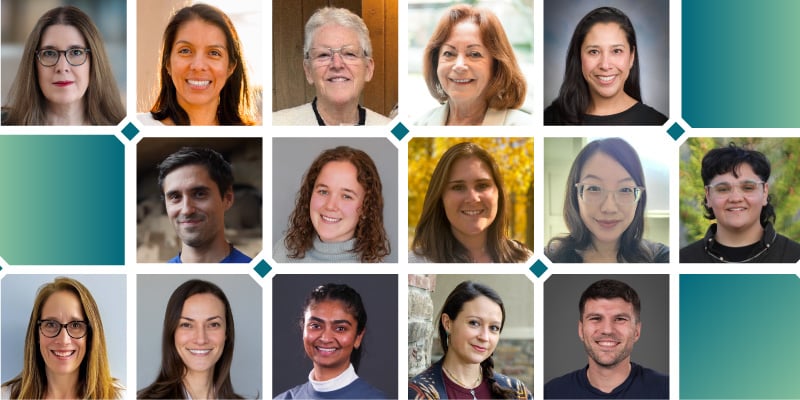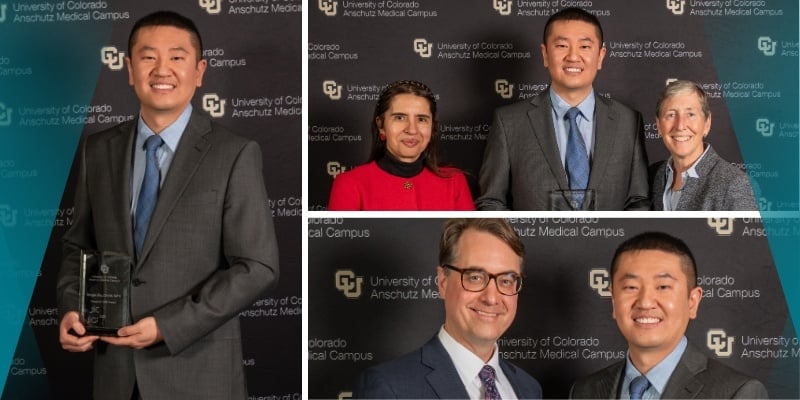Erin Burk-Leaver has spent more than a decade advocating for and serving older adults. She is also committed to spurring that interest in others — and the Colorado School of Public Health has taken note.
Burk-Leaver, Director of Community Engagement and former manager of the Healthy Aging Program for the Colorado Health Network Inc., received ColoradoSPH’s 2022 Community Preceptor Award for Excellence in Public Health Practice at the Public Health in the Rockies conference in Keystone. An important part of the recognition stemmed from her work as preceptor with Monica Maly, MPH, a recent Master of Public Health (MPH) graduate from ColoradoSPH at the University of Colorado Anschutz Medical Campus. The two have recently garnered national attention for their collaborative efforts.
Maly, who was an MPH student in community and behavioral health at ColoradoSPH, completed her practicum and capstone work with Burk-Leaver on a project to address the needs of a growing population: people living with HIV who are 50 years and older and are at a higher risk of cognitive impairment. Thanks to remarkable advances in anti-retroviral drug treatments, 50% of people living with HIV are in that age group, Burk-Leaver noted. In Colorado, the percentage is even higher, at 55%.
“It is therefore very important to focus on this particular population because it’s going to continue to grow,” Burk-Leaver wrote. Care for the symptoms of HIV and aging intersect, but have historically been siloed rather than mutually addressed with integrated care. As a result, Burk-Leaver has been working — with the help of ColoradoSPH’s now-alum Maly — toward new, integrative care solutions.
Considering a cognitive screening tool
Burk-Leaver wanted to determine the feasibility of supplying medical case managers with a geriatric cognitive screening tool to look for the signs and symptoms of cognitive impairment in older people living with HIV. But before doing that, she needed to assess their knowledge of aging and HIV in clients. Enter Maly, who responded to Burk-Leaver’s job position post for a student intern to contribute to the task.
The project began with Maly conducting a review of the scientific literature that revealed not only that aging with HIV puts an individual at higher risk for cognitive impairment, but also that there generally are prevalent gaps in the education of medical case managers about that risk. The question for the Colorado Health Network was whether those knowledge gaps applied to their own medical case managers and those at other Colorado-based AIDS Service Organizations (ASOs).
Taking the measure of case managers’ awareness of cognitive decline
Maly then produced an Institutional Review Board (IRB-approved) electronic questionnaire sent to medical case managers in 11 ASOs. The document assessed their familiarity with the warning signs and risk factors for cognitive impairment, their confidence in screening for it, their knowledge of HIV and aging, and their acquaintance with referral resources for clients who need more care. The results did indeed identify the need for more education in all these areas. In addition, the case managers acknowledged that they had received very little training to help them serve aging clients living with HIV and cognitive impairment.
“The questionnaire showed that the training was both necessary and wanted by case managers,” Maly wrote.
Based on this groundwork, Burk-Leaver developed a training module for medical case managers to help them recognize and identify the warning signs and risk factors of cognitive impairment among their aging clients living with HIV. The material covered baseline knowledge of brain health, ways to detect cognitive health risk, and how to refer at-risk patients for follow-up and additional assessments. Burk-Leaver’s team also created a screening form for cognitive impairment and provided training on how to use it. Medical case managers at Colorado Health Network have now integrated the screening tool into their work with their clients living with HIV who are 50 years and older.
“The success was driven by the support and input of the medical case managers,” Maly said. “Without that, the project would not have gotten off the ground.” The appreciation was reciprocal, she added. Training post-tests showed that 100% of the case managers found the education useful.
“They reported that they feel comfortable now that they have the tools to adequately recognize cognitive impairment warning signs and risk factors in their aging clients,” Maly said. “I felt that all my hard work paid off.”
Wider recognition for the work
Burk-Leaver concurred. “This project really helped us in getting the buy-in we needed to show how important [screening for cognitive impairment] is for the implementation of an integrative geriatric program,” she said.
The work has also garnered wider recognition. Maly created the materials for a poster presentation at the four-day Alzheimer’s Association International Conference last summer. Burk-Leaver recently presented their work in November to the Annual Scientific Meeting of the Gerontological Society of America and the annual meeting of the American Public Health Association. In addition, they are at work on a manuscript they hope to submit to AIDS Care, a scientific journal.
Their shared commitment to addressing the needs of underserved people may help to explain their success. Burk-Leaver said she has had past and present mentors herself in Dr. Allison Webel of the University of Washington and Dr. Kristine Erlandson of the University of Colorado, both national leaders in studies of care for people living with HIV. She went on to work in prevention of older adult mistreatment and in global operations with the International Association for Gerontology & Geriatrics before moving on to the Colorado Health Network (CHN) to serve older adults living with HIV.
“Working at CHN is the direct result of my passion for service and advocacy for marginalized populations of older adults,” Burk-Leaver said, “specifically when working with our clients aging with HIV; many
of whom have spent their lives committed to advocating against injustices and laws that perpetuated
stigma and health disparities.”
Maly majored as an undergraduate in integrative physiology at the University of Colorado Boulder and considered a clinical career before she decided she wanted to pursue work in preventive care and ultimately in public health. Throughout her early work, she said, her “most instant connections” came with aging patients/clients.
“I always found that was what I was looking for,” Maly said. An undergraduate course on maintaining health as the population ages “solidified my desire to find a career in healthy aging,” she said. Burk-Leaver’s job posting “combined my interest and passion for advocating for an aging population as well as providing a lot of educational opportunities to learn about individuals living with HIV.”
Burk-Leaver was “first and foremost a mentor, which has been very pivotal in my journey during school and since graduation,” Maly said. “Erin was excited to share her knowledge and always looking for the next thing to improve on and to provide additional support for the populations she is serving. She is always looking to better educate herself and others around her.”
Passing on knowledge
For her part, Burk-Leaver said she values conveying her commitment to gerontology and the field of public health to others.
“What I love most about working with students is being able to engage them in areas of public health they may have never considered pursuing and opening their eyes to the intersectionality within the field [such as aging and HIV],” she said.
In Maly, she found someone willing to follow that path, Burk-Leaver added. “I admired Monica’s earnestness to learn more about the HIV sector,” she said. “Her passion for helping older adults was already there, and it was clear she was excelling in her program. I’m grateful to the Colorado School of Public Health for encouraging their students to engage with the community and participate in programs like ours.”






